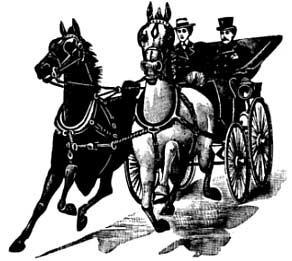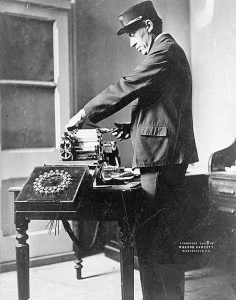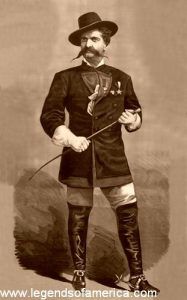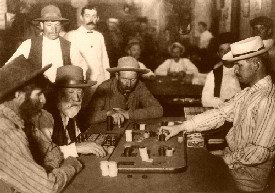Bill Bradley, Gambler And Gentleman – Legends of America (original) (raw)
By John A. Hill and Jasper Ewing Brady in 1898
Telegraph Operator.
Telegraphers are, as a rule, a very nomadic class, wandering hither and thither like a chip buffeted about on the ocean. Their pathway is not always one of roses, and the jagged rocks of adversity often tear their feet. I was no different from any of the rest, neither better nor worse, and many a night, I have slept with only the deep blue sky for a covering, and it may be added — sotto voce — it is not a very warm blanket on a cold night. ‘Tis said, an operator of the first class can always procure work, but there are times when even the best of them are on their uppers. For instance, when winter’s chill blasts sweep across the hills and dales of the north, like swarms of swallows, operators flit southwards to warmer climes, and for this reason, the supply is often greater than the demand.
I was a “flitter” of the first water, and after I had been in Fort Worth for a very short while, I became possessed of a desire to see something of the far-famed border towns along the Rio Grande frontier. So I went south to a town called Hallville and found it a typical tough frontier town. I landed there all right enough and then proceeded to gently strand.
Work was not to be had, money I had none, and my predicament can be imagined. Many of you have doubtless been on the frontier and know what these places are. There was the usual number of gambling dens, dance halls, and saloons; of course, they had their variety theater. Ever gone into one of the latter places? The first thing that greets your eye is a big black-and-white sign: “Buy a drink and see the show.” Inside, at one end, is the long wooden bar, presided over by some thug of the highest order, with a big diamond stuck in the center of a broad white shirt front. At the other end is the so-called stage, where the tables and chairs are scattered about indiscriminately. The air is filled — yea, reeking — with the fumes of bad whiskey, stale beer, and the odor of foul-smelling cheap tobacco smoke, and through all this haze, the would-be “show” goes on, and whistles, catcalls, the pounding of feet on the floor and glasses on the tables manifest the applause. Occasionally, some artist will appear who does not seem to strike the popular fancy and will be greeted by a beer glass or empty bottle being fired at their head.
Now, at the time of which I speak, my prospects were very slim, and as nature had endowed me with a fair singing voice, I had just about made up my mind to go to the Palace Variety Theatre and ask for a position as a vocalist. I could, at least, sing as well as some of the theatrical bygones that graced the place. Admission in one of these places is simply the price of a drink. I felt in my pocket and found that I had one solitary, lonely dime, and swinging aside the green baize door, I entered.
Beer Mug.
“Gimme a beer,” I said, laying down my dime. A small glass, four-fifths froth and one-fifth beer, was skated at me by the bartender from the other end of the counter, and my dime was raked into the till.
Then I stood around like a bump on a log, trying to screw my courage up to ask the blear-eyed, red-nosed Apollo for a job. Some hack-voiced old chromo was trying to chirp, “Do they miss me at home,” and mentally, I thought, “If he had ever sung like that when he was at home, they were probably glad he had left.”
The scene was sickening and disgusting to me, but empty stomachs stand not on ceremony, so I turned around and was just about to accost the proprietor when Biff! I felt a stinging whack between my shoulders. Quickly I faced about, all the risibility of my red-headed nature coming to the surface, and there I saw a big handsome chap standing in front of me. Six feet tall, broad-shouldered, straight, lithe limbs, denoting Herculean strength, a massive head poised on a well-shaped neck, two cold blue eyes, and a face covered by a bushy brown beard; dressed in well-fitting clothes, trousers tucked in the tops of shiny black boots, long Prince Albert coat and a broad sombrero set rakishly on one side of his head. Such was the man who hit me in the back.
“Hello, youngster; what’s your name?”
Rubbing my lame shoulder, I said, “Well, it might be Jones, and it might be Smith, but it ain’t, and I don’t know what affair it is of yours, anyway.”
“Oh! Come now, boy, don’t get huffy. You’ve got an honest face and appear to be in trouble. What is it? Out with it. You’re evidently a tenderfoot, and this hell-hole of vice isn’t a place for a boy of your years. What’s your name? Come over here at this table and sit down and tell me.”
Something in his bluff, hearty manner gave me hope, and after sitting down, I said.
“My name is Martin Bates. I’m a telegraph operator and blew into this town this morning on my uppers. I can’t get work and don’t have a red cent in my name. It is necessary for me to live, and as I can sing a little bit, I came in here to see if I could get a job warbling. I won’t beg or steal, and there is no one here I can borrow from. There’s my story. Not a very pleasant one, is it?”
“There may have been worse. How long since you’ve had anything to eat.”
“Nine o’clock this morning,” I grimly replied.
“Good Lord, that was 12 hours ago. Come with me out of here, and I’ll fix you up.”
Meekly, I followed my newfound friend. I was sick at heart, weary, and worn out in body, and I didn’t care a rap whether school kept or not; anything would be better than my present situation. He took me about three blocks up the main street, and we entered a beautifully furnished suite. He rang a bell, a darkey came in, and it wasn’t long before I had lunch in front of me fit for the gods, and I may add it didn’t take me many minutes to get outside of it. My friend watched me narrowly while I was eating, and when I had finished, he said,
A Dandy.
“Now, youngster, you’re all tired out. You go to bed in the next room and get a good night’s sleep. In the morning, we’ll see what we can do for you, but one thing is certain: you’re not going into that vile hole of a Palace Theatre again. Somewhere in this world, you have a father and mother praying for you this night. Don’t make a slip in your pathway in life and break their hearts. Everything is safe and quiet here, and no one will disturb you until I come in the morning.”
There was a peculiar earnestness in his voice as he spoke that was very convincing, and as he rose to go out, I meekly said,
“What’s your name, mister?”
“Bill Bradley,” he answered with a queer smile. “Now, don’t you ask any more questions tonight,” and with that, he was gone.
I went to bed almost sick from my exposure and lack of food, and just as the old sandman of childhood’s happy days began to sprinkle his grains in my eyes, I heard, way off in the distance, a peculiar click and a drawling voice calling off some numbers. “Four.” “Sixteen.” “Thirty-three.” “Seventy-eight.” “Ten.” “Twenty-six,” and then, a great shout arose, and someone called out, “KENO.” Ah! I was near a gambling house, but I was too tired to care. Nature asserted herself, and I gently crossed the river into the land of Nod.
The following day, I was sick with a high fever, and when Bill came in, I was well-nigh loony.
“Hello,” he said, “this won’t do., Tom, I say, you Tom, go and tell Doctor Bailey I want him here quick. D — n quick. Do you hear?” and black Tom answered, “Yas, suh.”
To be brief, I was three weeks on my back, and bluff old Bill Bradley nursed me like a loving mother would a sick child. Day and night, he hung over me; never a thing did I need but what he procured for me, and one day after the fever had left me and I was sitting up by an open window, I said,
“Mr. Bradley, what do you do for a living?”
“Boy,” he replied with a flushed face, “I am sorry you asked that question, but sooner or later, you would have heard it, and I’d rather tell you about it myself. I’m a gambler, and these three rooms adjoin my place, called the “Three Nines,” and then he told me his life story. He was the son of a fine Connecticut family, a graduate of Harvard, and, in his day, a very able young lawyer with brilliant prospects. Still, one night, he went out with a crowd of roistering chaps, the lie was passed, and — it was the old story, — he came to Texas for a refuge. The great civil war was just over, the country in a chaotic state, and there he had remained ever since. Thrown with wild, uncouth men and being reckless in the extreme, he opened a gambling house.
“Why did you take this great interest in me?” I asked.
“Look here, young chap, you are altogether too inquisitive. I’ve got an old father and mother way up in Ball Brooke, Connecticut, whose hearts have been broken by my actions, and when I saw you in that hellish den of vice, you looked so out of place that I determined to save you. It was an impulse, my boy, and then again, it may have been the remembrance of the one at whose knee I used to lisp, ‘Now I lay me down to sleep.'”
Playing Faro.
My recovery was very rapid from then on, and when I could work, I secured a position in the commercial office in Hallville. One evening after being paid, I strolled into the “Three Nines;” Bill was dealing faro, and I thought I might, in a measure, show my gratitude towards him by risking a coin. A big crowd stood around the table, but I edged in and placed a dollar on the queen to win. Luck was with me, and I won. Once, twice, thrice, the cards came my way, and my stack of whites and reds was growing. This didn’t seem to me much like gratitude to win a man’s money, and I wished I hadn’t started. Bill looked up and, spying on me, pointed to my stack of chips and said, “Whose stack is that?”
“Mine,” I replied, and with one fell swoop, he dashed the chips into the rack. Taking a ten-dollar bill from the drawer, he turned to his side partner and said, “Jim, take the deal.” Then he got up and took me by the arm, saying, “You come with me.”
Feeling like a sneak, I followed him, and when we reached his sitting room, he sat down and said,
“Kid, how much were you in on that deal?”
“Just one dollar,” I replied.
Then he looked at me, his eyes shone like coals of fire, and he said,
“Look here, boy, here’s ten dollars. If you are ever hard up and want money, come to me, and I’ll give it to you willingly, but don’t you ever let me see or hear of you staking a cent on a card again. I’m running a gambling house, and as gambling houses go, it’s an honest one, but I’m not out plucking lambs like you. Your intentions were probably good, but don’t ever do it again. If you want to show your gratitude for what I have done for you, promise me honestly that you will never gamble.”
I felt very humiliated, but I took his advice and promised, and I have never flipped a coin on a card since that night.
Bill was a married man, and in addition to his suite of rooms spoken of, he had a very nice residence on Capitol Hill. His suite was a side issue to be used when the games were running high. I had never met Mrs. Bradley, but during my illness, I had evidence every day of her goodness in the shape of many delicacies that found their way to my bedside. I had repeatedly asked Bill to take me out to meet his wife, but he always put me off on one pretext or another.
When I started to work, I secured a room at Mrs. Slade’s house. She had three daughters, and one Sunday afternoon, we were all out walking together when one of them pointed to a very fine residence and said, “That’s the residence of Bill Bradley, the big gambler.”

Couple in horse and buggy.
Just then, Bill and his wife came driving by behind a spanking team of bays. Quick as a flash, my hat came off, and I bowed low. Bill saw it and very cavalierly returned my salute. The elder Miss Slade turned on me like a tigress and said, “Mr. Bates, do you know who that man is? Do you know what he is?”
“Yes, I know him very well,” I replied.
“Then what do you mean by insulting us by speaking to such a man? I did not know that you associated with men of his ilk.”
I told them of Bill Bradley’s kindness to me in a plain, objective way, but it was a go. As I would not renounce my liking for the man who had been my benefactor, my room in their house became preferable to my society, and I left.
The next evening, I saw Bill in his room, and he said,
“Martin, yesterday, when Mrs. Bradley and I drove by you and the Slade girls, you spoke to me and lifted your hat to Mrs. Bradley. I could do naught but return the salute. Now, my boy, there’s no use in mincing words with you; I befriended you and probably saved you from ruin, but young as you are, you know full well that our paths do not parallel each other. I am a gambler, and although Mrs. Bradley is as good a woman as ever lived (and I’d kill the first man that said she wasn’t), we are not recognized by society; no, not even by the riff-raff that live in Hallville. You have your way of carving in the world; don’t ruin it right at the outset by letting people know you are friendly with gamblers. No matter how good your motives may be, this scoffing world will always misconstrue them and censure you.”
This made me hot, and I told him so. No matter if he was a gambler, he was more of a gentleman than nine-tenths of the men of society, yes, men, who would come and gamble half the night away in his place and then go forth the next day and pose as models of propriety.
The upshot of the whole business was that I left Hallville soon after this and went to San Antonio to take a day report. One day, I picked up a paper and read an account of how Bill Bradley had been assassinated by a cowardly cur who had a grudge against him. He was stabbed in the back and thus ended the career of Bill Bradley, gambler and gentleman.
By John A. Hill and Jasper Ewing Brady, 1898. Compiled and edited by Kathy Alexander/Legends of America, updated April 2024.
Author & Notes: This tale is adapted from a chapter of John A. Hill and Jasper Ewing Brady’s book, Danger Signals, first published in 1898 and again in 1902 by Chicago Jamieson-Higgins Co. The tale is not 100% verbatim, as minor grammatical errors and spelling have been corrected.
Also See:
An Encounter with Train Robbers (Hill and Brady 1898)
Blue Field, Arizona & An Indian Scrimmage (Hill and Brady 1898)
Some Freaks of Fate (Hill and Brady 1898)
Mormon Joe – The Robber (Hilly and Brady 1898)
The Railroad in the American West (main page)



